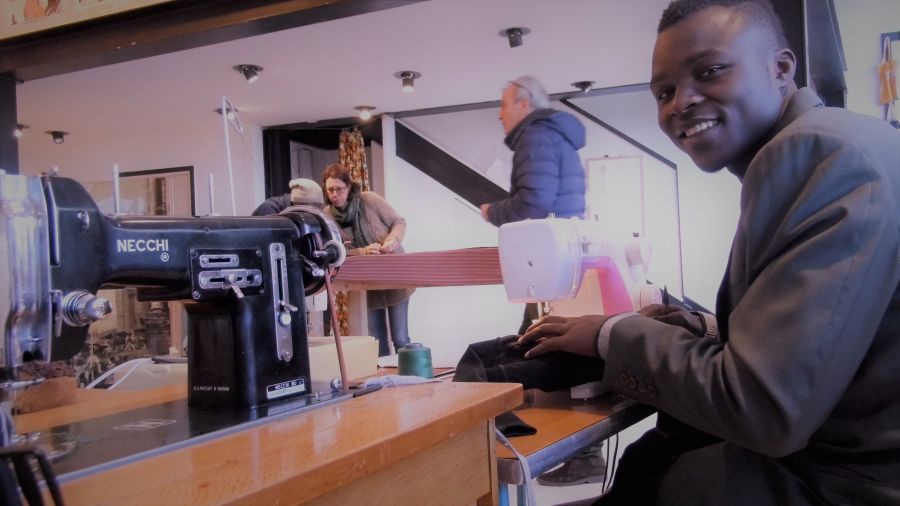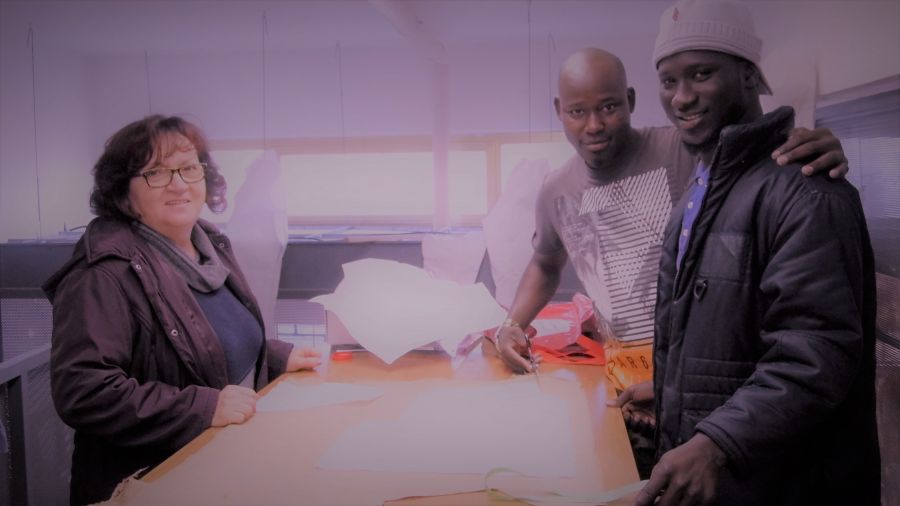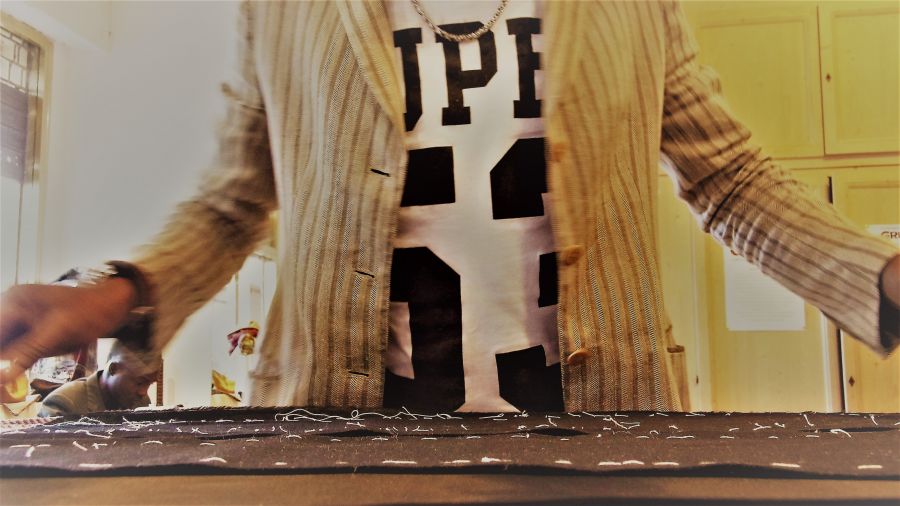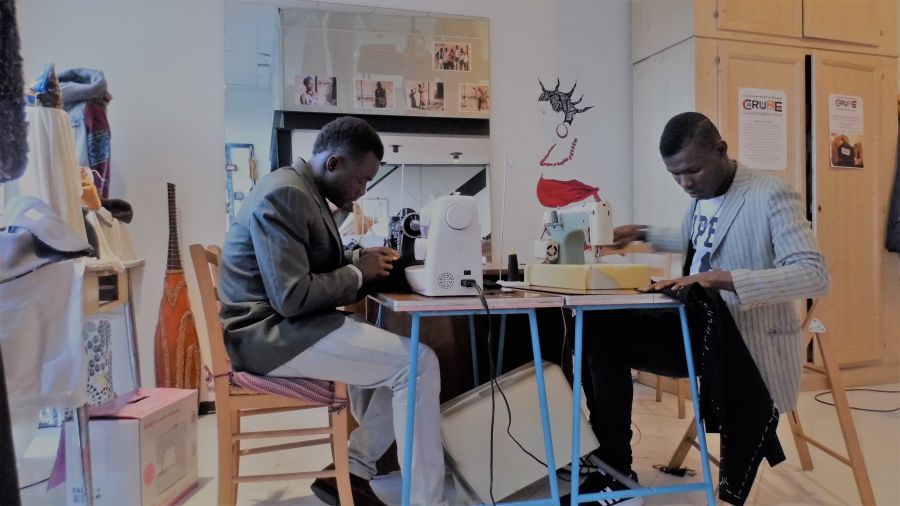
Workshop
Crunelab, the “Made in Italy” by African hands

Crunelab is not only a solidarity tailor workshop, but a point of meeting and a real multi-cultural workshop to improve one’s knowledge, talents, and cultural approaches.
There is a bit of Africa concentrated right in the heart of Tuscany, in these premises at number 34 of Via Sabatini, in Chianciano Terme, a town in the countryside of Siena, famous for its healthy thermal springs. Here, among tissues, sewing machines, spools of thread, and pieces of chalk, a group of young asylum-seekers creates clothing and accessories for the “Crune” brand, a true “Made in Italy” by African hands.
Salif comes from Abidjan, Ivory Coast. He has a great desire for learning as well as slim and light hands that move elegantly over a recently basted dark tissue. Boubacar, called “Bouba”, shows a wide and engaging smile while shaking my hands to introduce himself. He recently arrived from Mali with several years of working experience in the textile industry. Maxim, 24, comes from Guinea Conakry and he is a professional tailor who learned this art when he was just over four years old. Yes, you understood correctly. In fact, in his country, on important occasions, all the members of the family use a large cut of cloth from which they make clothes for everyone, and the whole family, including children, participates in manufacturing them. Then, there is Abdul, from Mali, who works at the sewing machine, and Ansumane, from Senegal, who attends the cutting lessons given by Elvira, who is a professional dressmaker from the nearby town of Chiusi.

This multi-ethnic group of creative artists is completed by the promoters of Crunelab: Nicolette, who comes from Zurich and Stefano, who is from Rome but he is now living in Siena.
“Today, the two young women from Nigeria are not here with us. They’re attending their Italian classes. One of them is Vittoria, the person who began it all”, Nicolette explains as she assists Salif with the ironing.
“I heard that there was a need of clothes for the young people arriving at the reception centres run by the “Misericordia” (a first aid provider, n.o.t.) of Chiusi. My father had given me a lot of clothes, but he asked me not to put them into the collection boxes, but to give them directly to those who needed them”.
This is how someone directed Nicolette to the Centre of Querce al Pino, which hosted a group of women.
“There were six of them and all of them were ‘disheartened’, if I can put it that way, by the long time they spent without doing anything. Then, one of them, Vittoria, stepped forward and confided to me that she would like to find a job in the field of sewing, because her dream was to become a professional stylist. I suddenly remembered the sewing machine I had in my house and all the tissues I had purchased during my trips to Asia, that I had never used… That’s how it all began!”

Since February 2007 Nicolette has been attending the reception centre of Querce al Pino twice a week, to work with Vittoria and the other women.
“The first sewing workshop began, but only Vittoria was working in it, because the other women had different interests: one had previous experiences as a hairdresser, another as a cook, and so on. But since last April, many young men became interested in my project, and now there are twelve of them”.
Stefano introduces them to me. He explains that the common language in the workshop is Italian, but also Bambara, one of the African languages that all the apprentice tailors understand, as some of them are English-speakers and others are French-speakers.
“Our idea – more than trying to teach them something – is to focus on their skills, their knowledge, and value them. Given the fact that they’re all very young, around twenty years old, it is really a waste of energy, leaving them there like that, doing nothing,” Stefano says “Crunelab is intended to be a multi-cultural and multidisciplinary working space with exactly this purpose – valuing these young people. For the time being, the main activity is ‘Crune’, the tailor workshop where they are trained about how to manufacture suits and fashion accessories”.

This attention to the talents of the other workers is tangible in the atmosphere of the tailor shop, which makes one assume that the role of Stefano and Nicolette is not only organizational.
“Once you begin to get to know them in depth you can’t help but being taken in. As a matter of fact, we take care of these young people from all sides. We accompany them to their medical appointments, we help them with bureaucratic matters and, sometimes, to find a job,” Stefano explains.
“We’re like friends who stand by them,” Nicolette concludes, “and at times it takes very little: a smooth conversation in English or in French, to better describe the symptoms of some illness to the doctor…”
It is time to leave and, as I drive along a relaxing countryside rich with hills and old mansions, I am thinking that I just had the honor of being in touch with one of those “good deeds” that never make a lot of noise but contribute to creating a new social fabric which is multi-ethnic and hard-working: a bit Italian and a bit African, with a touch of Switzerland.
Crunelab is run in collaboration with the ‘Misericordia’ of Chiusi, which made available two professional tailors to work in the project, Elvira and Roberta.



